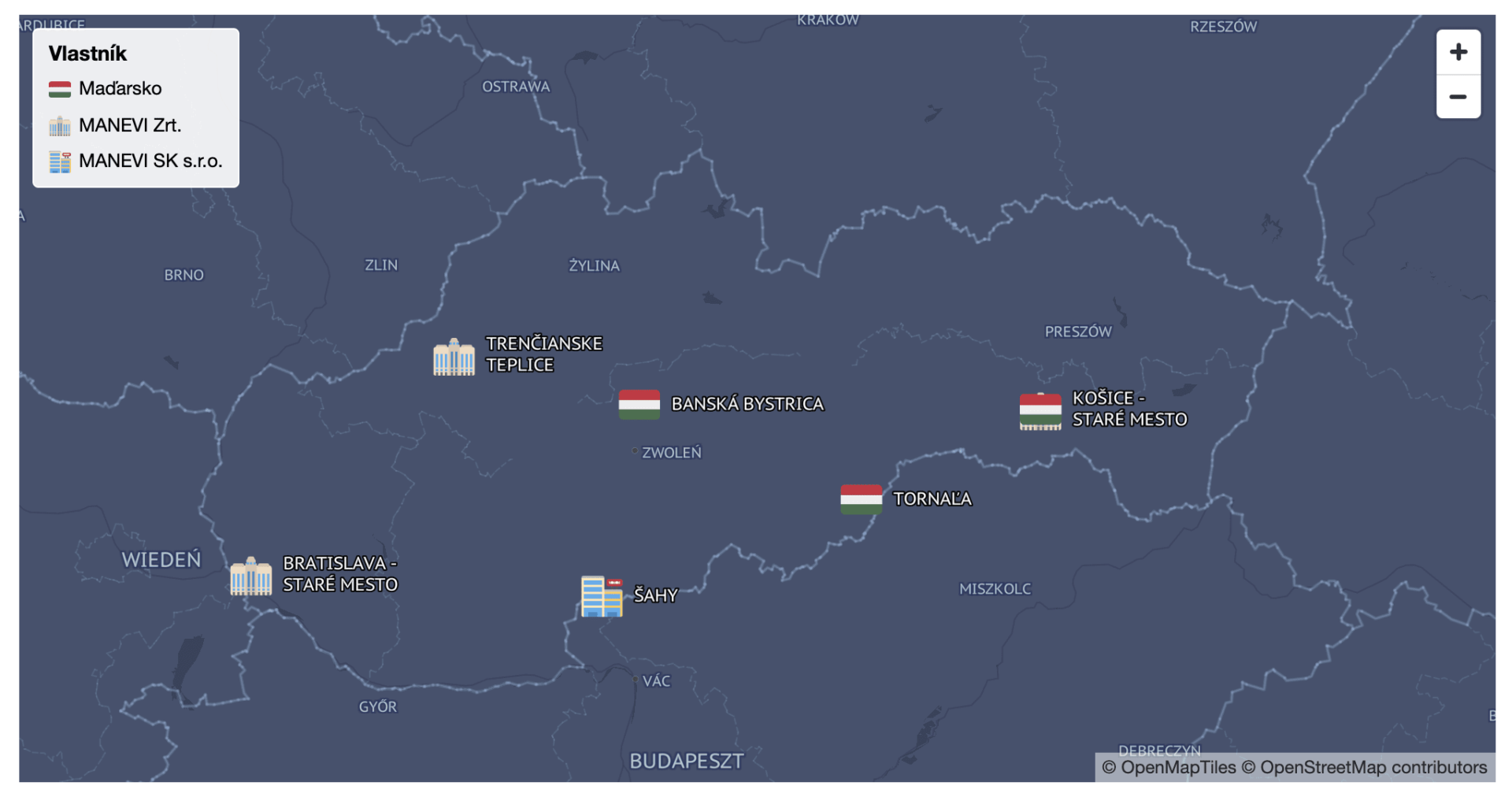The Hungarian government is directly purchasing real estate in neighbouring countries, using an unassuming company and a state foundation to do so. The goal of the Foundation for Preserving Immobile Heritage in Central Europe (Közép-európai Épített Örökség Megőrző Alapítvány) is to preserve “buildings of significance for Hungarian historical and cultural heritage” in the Central European region. The foundation is mainly focused on Romania, Croatia, Serbia, and Slovakia. It purchases historic buildings and structures without informing local governments.
The Slovak version of this article was originally published on icjk.sk
In the summer Hlavná Street in Košice pulsates with life, and visitors to the city cannot miss it. The main square, lined with historical buildings, is dominated by two structures, the State Theatre and the Cathedral of Saint Elizabeth. Directly next to the cathedral stands an unassuming building, which for many years housed small shops and a branch of OTP Bank.
But things have changed. In October 2020 OTP Bank became ČSOB Bank, and then in early 2021 a more fundamental change affecting the whole building occurred. Data obtained from the title deed indicate that on 11 January 2021 the building was purchased by a Budapest-headquartered company called Manevi. Manevi, headquartered not far from the Hungarian parliament, plays an important role in buying up foreign real estate to the benefit of Hungary.
It belongs to the Foundation for Preserving Immobile Heritage in Central Europe. The establishment of the foundation was accompanied by substantial movements of state-owned assets. A law establishing the foundation was approved by a supermajority of the Hungarian parliament in mid-2020, and granted its shares in two state-owned companies, which at the time belonged to the portfolio of the Hungarian Ministry of Foreign Affairs: Comitatus-energia Beruházási Kereskedelmi és Szolgáltató and Manevi. At that time, both already owned real estate outside of Hungary.

Source: Google Street View
The foundation came into existence in February 2021, and according to registration documents, the assets transferred to it from Manevi and Comitatus-energia amount to nearly 16 billion forints (approximately 44 million euros). In April 2021 these two state-owned companies were deleted from the list of companies managed by the Hungarian Ministry of Foreign Affairs.
According to the website hvg.hu, the Hungarian government permanently handed over these companies to the newly established foundation. Court data confirm this: since 5 March 2021, Comitatus-Energia and Manevi have not been owned by the Hungarian state but by the Foundation for Preserving Immobile Heritage in Central Europe.
The foundation and the companies it owns are controlled by a board of trustees led by the deputy minister of foreign affairs and state secretary Levente Magyar. The other board members are also close to the governing Fidesz party of Prime Minister Viktor Orbán.
Buying Property in Slovakia
Information about Hungary’s purchasing of real estate in Slovakia was first published in the summer. The daily Korzár reported that Hungary bought two lucrative historic buildings in the centre of Košice, one on the corner of Hlavná and Poštová Streets, known as Čáki-Dezőfi Palace, and a burgher house at Hlavná 42. According to a real estate agent that Korzár contacted, the price of these two properties combined could have been 3 to 4 million euros. According to information from the Slovak Cadastre of Real Estate, these buildings were purchased in late 2020 and early 2021.
The Hungarian Ministry of Foreign Affairs and Trade owns, besides these buildings, another property in the centre of Košice, a burgher house at Mäsiarská 9. It was purchased at the beginning of December 2020. According to information obtained by the daily SME, Hungary also directly owns real estate in Banská Bystrica and Tornaľa.

The building owned by Hungary in Banská Bystrica. Source: Google Street View
Last Wednesday the Investigative Center of Ján Kuciak (ICJK) contacted the Slovak Ministry of Foreign Affairs and asked if it had an overview of how many pieces of real estate Hungary owns, either directly or indirectly, in Slovakia. We also asked whether there are ways to prevent other countries from buying up real estate in Slovakia and whether the ministry has any plans for dealing with these recent purchases. The ministry had four working days to respond before we originally published the Slovak-language version of this article, but we received no reply, even after making several urgent requests.
But in an interview for Radio Patria, Minister of Foreign Affairs Ivan Korčok indirectly admitted that he knows only about the buildings owned by Hungary that have been reported on in the media. “When a building is going to be purchased, it is a habit to announce it in diplomatic circles. The Hungarian government informed us of the purchase of its embassy in Bratislava, and we think that it should proceed in the same manner when it comes to the buildings in Košice,” stated Korčok. This statement indicates that the Slovak Ministry of Foreign Affairs does not know about the historic building next to the Cathedral of St. Elizabeth, which is owned by a company connected to a Hungarian governmental foundation.
But Košice is not the only Slovak city in which the Hungarian company Manevi has real estate. It also owns two buildings in Bratislava, one on Sedlárská Street and one on Palisády Street, the former Hungarian embassy and the Cultural Institute of the Hungarian Republic, respectively. According to the land registry, both properties came under the company’s ownership on 10 February 2021 “through the registrant’s declaration of making a non-cash contribution to the company.” According to the land registry, Manevi also owns real estate in Trencianske Teplice. The historic Vlára spa building.

Screenshot of ICJK visualisation, source: Real Estate Cadastre ZBGIS https://public.flourish.studio/visualisation/7560888/
Menevi has also established a daughter company in Slovakia. Manevi SK s.r.o. was founded on 5 February 2021 and is headquartered in Dunajská Streda. The Budapest-based Manevi has 100% ownership of the company. According to the commercial register, the managing director of the company is Dénes Köváry, a Hungarian citizen, and its agent is Tibor Rigó, a businessman from Dunajská Streda who conducts various business activities. The ICJK attempted to telephone the latter several times, but never got through.
We also sent Rigó a list of questions to be forwarded to the managing director or the true owner of the company. We never received a response. We also posed the same questions to the Hungarian Embassy in Slovakia and the Hungarian Ministry of Foreign Affairs, neither of which responded either. We asked what the company plans to do with the acquired buildings and whether it plans on continuing purchasing real estate. One month after the Slovak branch of Manevi was established it already owned real estate near the Hungarian border.
A Monastery Bought over the Internet
About a month after Manevi SK came into existence it quietly bought a monastery in Šahy. The purchase of the monastery, which occurred over the classified advertising website Bazoš, was announced last year by Örs Orosz, the vice chairman of the Togetherness (Spolupatričnosť) movement and the chairman of the Sine metu civic association, who stated that the civic association had bought the Premonstratensian monastery.
Two months after the purchase, Orosz posted on Facebook that he had “spoken with deputy foreign affairs minister Levente Magyar and state secretary Orsolya Pacsay-Tomassich [both figure in the Foundation for Preserving Immobile Heritage in Central Europe, which is behind Manevi] in Budapest about current events surrounding the Premonstratensian monastery and the possibilities of renovating this national cultural monument to preserve it.”
The monastery and surrounding land came into the ownership of Manevi SK based on purchase agreements from 2 March 2021 and 8 March 2021.
Representatives from Sine metu made it public in late August that Manevi SK, which is connected the Hungarian government foundation, was the investor. A report published in the daily Új Szó refers to this company as an investor from Dunajská Streda “that plans on renovating the property beginning in 2022 after an archaeological survey”.
In the first half of October, Minister of Foreign Affairs Ivan Korčok announced that he had requested the director of the Geodesy, Cartography and Cadastre Authority of the Slovak Republic to inform relevant bodies, including the Ministry of Foreign Affairs, whenever any property is registered in the name of any foreign state in the Slovak Republic as of 15 October. It is not clear, however, whether this change will affect purchases by companies such as Manevi SK.
Manevi’s Background
The Hungarian media first took notice of this company belonging to the portfolio of the Hungarian Ministry of Foreign Affairs in 2018. At the time, it came to light that in 2017 the Hungarian state purchased the Romanian company Dacia SA and in the process acquired an iconic historic building in the centre of the Romanian city of Satu Mare – the former Hotel Pannónia. The purchase agreement, however, was never made public. The Átlátszó news server requested the agreement but was denied. The official reason given was commercial confidentiality. Soon thereafter, the Hungarian National Office for Data Protection and Information Freedom accepted this argument, stating that the building was not state owned but a commercial property.
Before 2017 Manevi was hardly so active. For years, it seemed to be a dormant company, but in 2017 it increased its capital to 2 billion forints and to 8.5 billion forints the following year (altogether more than 29 million euros). It was the second increase in capital that caught the attention of the Hungarian media. Manevi along with other practically unknown state-owned companies received nearly 50 million forints from public funds.
Before then, Manevi had never dealt with real estate. According to annual reports in 2016 and 2017 it engaged in “consulting activities in business and other management”. Manevi’s economic activities was later changed to “the rental and operation of owned or leased real estate”. According to information from land registries from the countries neighbouring Hungary, it seems that after its economic “awakening” this state company went shopping in Romania, Croatia, and Slovakia.
A Shopping Spree
In 2019 Manevi continued buying historic buildings in Romania. According to the information obtained by the Romanian news site buletindecarei.ro, on 10 December the company purchased the former Albina bank building in the city of Carei, which until 2014 was the location of the mayor’s office.
According to information from the Átlátszó investigative journalism site, at the exact same time the company bought another piece of real estate: Hotel Korona in the city of Sighetu Marmației. A year later the company published a call for public tenders for a project to renovate the building. The call was published in Tenders Electronic Daily (TED), the EU’s public procurement journal.
In May of this year Manevi bought another historic building, the Wesselényi manor house in Jibou, Romania. This two-storey structure was built between 1779 and 1796 and has a usable area of 2,200 square metres.
But the company has been active outside of Romania, too. In late July 2020, it bought a historic building in Osijek, Croatia. This purchase came to light only in early May 2021. A notification was published in the EU’s TED journal indicating that the call for tenders published by Manevi for renovation work in Croatia was unsuccessful.
Whether or not the company owns property in Serbia is currently unknown. But the Serbian commercial register does list a firm titled Manevi Ingatlanfejleszto doo Novi Sad. The company was founded on 6 April 2021. It is a subsidiary of the Hungarian-based Manevi.
 Support independent investigative journalism in Slovakia,
Support independent investigative journalism in Slovakia,
you can donate here.
Peter Kapitán is a Slovak journalist at Ján Kuciak Investigative Center (ICJK)






